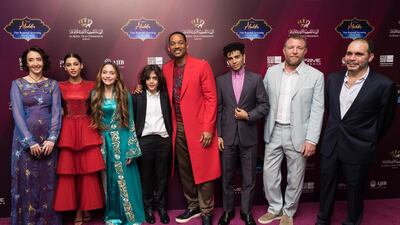When it comes to reasons for visiting Jordan, you'll be hard-pressed to find a better salesman than Will Smith. The movie star spent up to 10 days in the kingdom's majestic Wadi Rum desert in 2017 as part of the shoot for the recently released live-action reboot of Aladdin. Fronting the press earlier this month in the offices of the Royal Film Commission (RFC) in the capital, Amman, Smith was adamant that the country will receive a tourism boost as a result of the movie.
"It's basically a love letter to the region," he said. "When the kids see this film, I want them to immediately feel 'ooh, I want to go there'."
This was all music to the ears of Princess Rym Ali, who is part of the board of commissioners at the RFC, the organisation, which provided logistical and local crew support to Aladdin's international production team.
Aladdin is a local triumph
While Smith's enthusiasm was infectious, his endorsement is merely confirmation of what the greater film industry has known for more than five decades.
We've had the picturesque desert vistas portrayed in the 1962 historical drama Lawrence of Arabia. Then there was the rugged backdrop to the intergalactic battles in the 2009 action blockbuster Transformers: Revenge of the Fallen. Next is the coming Star Wars instalment Episode IX: The Rise of Skywalker and the anticipated remake of the Sci-Fi classic Dune. In each, Jordan's natural beauty and political stability have made it a haven for directors looking to add a touch of exoticism and soul to their pictures.
However, it is the local shoot of Aladdin, which is deeply rooted in the region (the original short story was published as part of One Thousand and One Nights) that's the jewel in Jordan's production crown.
"To have the film here is definitely a coup for us," Princess Rym tells The National. "There are times to be modest and there are times when it's OK not to be. And this is definitely a time when it's OK to celebrate."
The successful production of Aladdin is a triumph for the RFC, which has been attracting films to the kingdom for more than a decade, thanks to its cashback rebate scheme, which was recently boosted from 20 per cent to 25 per cent of production costs. The policy presently applies to film teams spending a minimum of $1 million (Dh3.6m), but the commission is reportedly looking to reduce that figure to allow lower budget films to benefit from the incentive.
As someone who helped drive the initiative, under the guidance of the chairman Prince Ali Bin Al-Hussein (the third son of the late King Hussein of Jordan), Princess Rym says the scheme came to fruition after two years of negotiations with the Jordanian government. She says discussions focused on illustrating the various ways in which the incentive could boost the kingdom's economy.
While acknowledging the scheme was initially viewed as risky, she says, "At the end of the day, we are offering a cash rebate on money that wouldn't be in the country." She goes on to describe how up to 150 Jordanian professionals from various sectors of society have benefited from a large production like Aladdin setting up in Jordan. "Everyone got involved, there was hospitality, catering, carpentry and make-up. So many people got jobs out of this."
A skill exchange
However, more than providing employment opportunities, the benefits of a big film working in the country is that it provides plenty of opportunities for the local film industry to rub shoulders with and learn from their Hollywood counterparts.
In terms of Aladdin, Princess Rym was pleased at the level of collaboration and knowledge exchange shared by the local and international crews. "Part of the contracts that we have always include hiring a certain amount of Jordanians and hiring interns," she says. "But I have to say, all the films that have come through have been extremely open with sharing their knowledge. Most of the producers, actors and directors were happy to give their time and talk to local filmmakers. A lot of them are very busy, but the fact they gave their time, from a day to a few hours, we are all grateful for that."
We may see the full fruits of these partnerships soon on the big screen. In what will not only be a boost to the country, but to the region's film industries, the RFC last week announced that the inaugural Amman International Film Festival will be held next year from April 13 to 18.
With the event already in the planning stages, and the Jordan-shot blockbusters Episode IX: The Rise of Skywalker and Dune set to premiere later this year, the kingdom's imprint on Hollywood will continue to grow.


